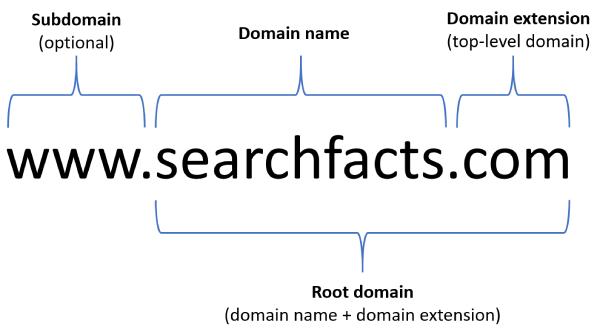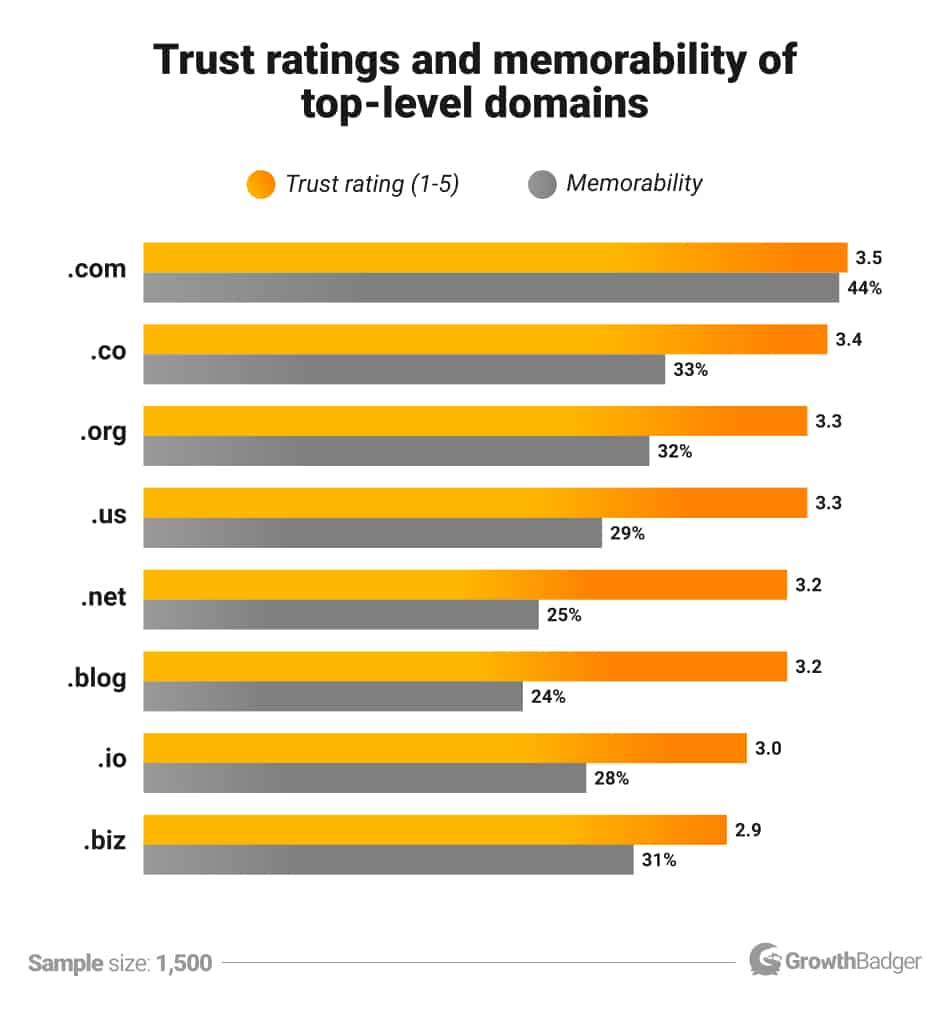Choosing a great domain name is one of the most important steps when starting a new website.
Although domain names don’t have strong direct effects on SEO, they do have huge indirect effects.
A domain name that is relevant and trustworthy is going to get a higher click-through rate from the search results and people will be more likely to visit the site and link to it.
On the other hand, if your domain name looks spammy then people won’t trust it and the site will never reach its full ranking potential.
Because of this, both your domain and domain extension really need to be considered if you want to get a lot of search traffic to your website.
What domain names consist of
Domains are the unique internet addresses of websites that are used by humans. A domain consists of three parts:
- Domain extension: Also termed a top-level domain or domain suffix. This is the .com, .net, co.uk, etc.
- Domain name: The unique name that you select, such as the “searchfacts” in searchfacts.com.
- Subdomain (optional): Some sites have a www subdomain for their main domain, while others have different subdomains for different parts of the website.
Here’s a diagram that shows this:

Although http:// or https:// is included in a site’s URL, it is not considered to be a part of the domain. It is referred to as the protocol.
Throughout the article, when I say “domain” then I am usually referring to the root domain, as in domain name + domain extension.
Bottom Line: A domain consists of a domain extension, domain name and optional subdomain.
Your domain extension really matters!
There are many domain extensions (top-level domains) to choose from.
The generic ones like .com, .net and .org are the most common, but then there are also country-specific ones like .co.uk (United Kingdom) and .in (India).
In addition, there are over a thousand less common extensions like .info, .biz, .guru, and others.
Google has strongly implied that domain extensions don’t have any direct effects on your rankings in search.
However, independent research has shown that your domain extension has a strong effect on both trust and memorability.
In a 2019 study by Growth Badger, the results clearly favored the .com domain extension. People were more likely to trust .com domains and more likely to remember them.

Trust is a huge factor for SEO because of Google’s E-A-T algorithm. A trustworthy domain is also more likely to be clicked on when people see it in the search results, which raises click-through rate (CTR).
Plus, memorability is likely to increase the effectiveness of word-of-mouth advertising and make it easier for people to visit your site by typing it into their web browser.
All of this is likely to lead to more visits and more inbound links, which can directly affect your SEO performance.
So if your site is in English and intended for the US or a global audience, then having a .com domain can provide a small advantage.
It doesn’t mean that a .net, .org or .co won’t be able to rank — but they probably won’t perform quite as well as the .com version.
That being said, if your website is in a language other than English or intended for a specific country, then it is better to choose the relevant domain extension — such as .co.uk for the UK and .de for Germany.
Having a country-specific extension is likely to help your site rank in searches done from that country.
Here’s a summary of which domain extension to choose for your site:
- If your site serves the US or a global English-speaking audience, choose .com.
- If your site is for a specific country or language, choose the relevant extension — such as .co.uk or .de.
- If you absolutely can not get the .com domain you want, choose a .co, .org or .net instead.
Whatever you do, don’t choose a domain extension that people associate with low-quality or spammy sites. Stuff like .biz should definitely be avoided.
Bottom Line: People are more likely to trust and remember a .com domain. This can have indirect effects on SEO, so the .com version should always be preferred for the US or a global English-speaking audience.
Avoid keyword stuffed domains
Back in the day, buying domains that were exact matches to keyword phrases used to be a common SEO technique.
These types of domains used to have a big ranking advantage for those exact keyword phrases.
An example would be buying the domain buydogfoodonline.com or buy-dog-food-online.com, then optimizing the site for the phrase “buy dog food online.”
However, Google adjusted their algorithm back in 2012 to make the exact-match domain (EMD) factor less relevant.
This had a big effect on many low-quality affiliate sites that often used these types of domains to gain a ranking advantage for specific keyword phrases.
But these days, keyword-heavy domains really do more harm than good, especially if you plan on building a high-traffic authority site that stands the test of time.
This is because people associate keyword-heavy domains with low-quality websites, so they are less likely to trust them.
Of course, it can be helpful for your domain name to look relevant to your industry, but it needs to look natural.
For example, if you are writing about dogs then it makes sense to include “dog” or “dogs” in a catchy way in the domain.
But a domain like buydogfoodonline.com clearly looks spammy and untrustworthy.
Bottom Line: It can help to have a word in your domain name that shows that it is relevant to your industry. But you should avoid keyword-heavy domains.
4 tips to pick a domain that is great for SEO
Here are 4 best practices to keep in mind when picking a domain name. All of them are likely to indirectly help your SEO performance.
1. Make it relevant and trustworthy
When people use a search engine, they quickly scan the search results before deciding which site to click on.
For example, they quickly scan the titles, descriptions, URLs and other features in the search results.
But the domain name of the website is also one of the main factors that people consider before deciding what to click on.
If it looks trustworthy and relevant to the nature of the search query, then they are much more likely to click on it.
As an example, I chose the name searchfacts.com for this website because it looks relevant to search queries about SEO.
Having a relevant and trustworthy domain name will get you more clicks from search engines, which is likely to boost your rankings over time.
Although click-through rate from the search results may not be a direct ranking factor, it can definitely be an indirect one.
2. Keep it memorable
The best domain names are memorable.
If your domain name is memorable, then people are more likely to be able to find your site again by typing it into a search engine or directly into their browser.
This can be useful to improve word-of-mouth advertising. If people remember your website’s name, then they are more likely to tell other people about it.
Shorter domain names are easier to remember than longer ones. Your domain should also be easy to and say and not be prone to spelling or typing errors.
If you can have a name that sounds catchy then that can improve the memorability even further.
3. Avoid hyphens at all costs
You may be tempted to use a hyphen (or two) in your domain name if it is two or more words.
However, people often associate hyphens in domain names with spammy and low-quality sites, so they are going to be less likely to click on your website or recommend it to others.
4. Use .com if possible
This is so important that it is worth repeating.
If your site’s content is in English and intended for the US or a global audience, then it is clearly best to have the .com domain extension.
But if you are targeting a site in a specific country or specific language, then use the relevant country-specific domain extension.
More
There are several more things you should do before you make the decision to buy a domain. You need to make sure that your domain isn’t tainted with a spammy history or low-quality backlinks.
For more details on this, here are 12 important things to do before buying a domain name.
Bottom Line: It can indirectly help your SEO performance to have a trustworthy, non-hyphenated .com domain that is relevant to your industry and easy to remember.
Domain names can have big indirect effects on SEO
Having a great domain can provide a small advantage for SEO.
This is mostly due to indirect effects like more trust, greater memorability, and a higher click-through rate.
At the same time, a really bad domain that looks spammy and untrustworthy can truly make it much more difficult for your site to rank in search engines.
For this reason, it makes a lot of sense to spend some time brainstorming the perfect domain name before starting your website. Changing the domain of a live site is a big deal, so you need to get this right at the start.
One thing you can do is write down 50-100 names that you like. Then you can use a domain registrar like NameCheap to see which ones are available.
Keep in mind that if you already have an established website, you should almost definitely not change your domain just to boost your SEO performance.
The negative effects of changing your domain are likely to outweigh the SEO advantage of having a better domain name.